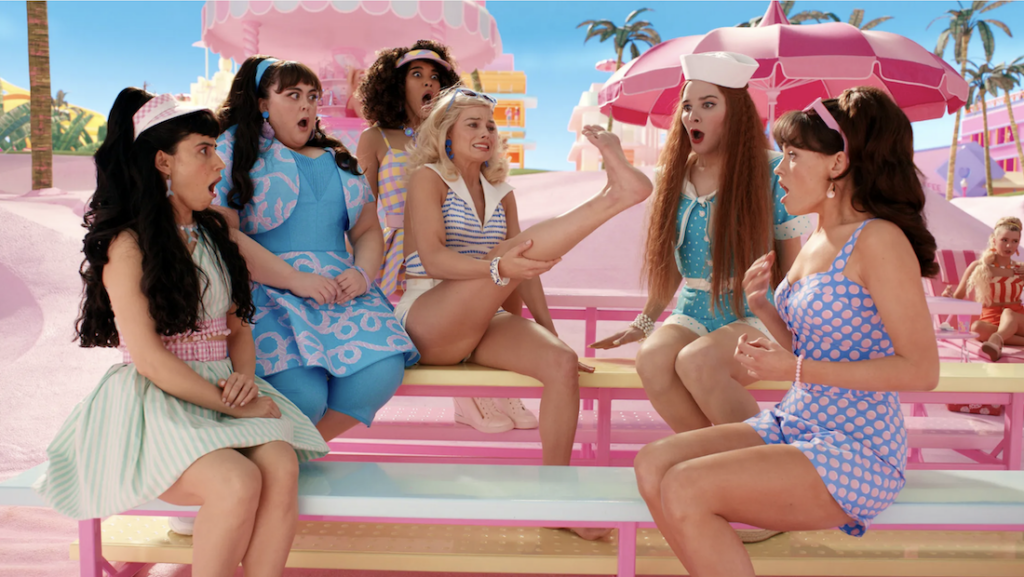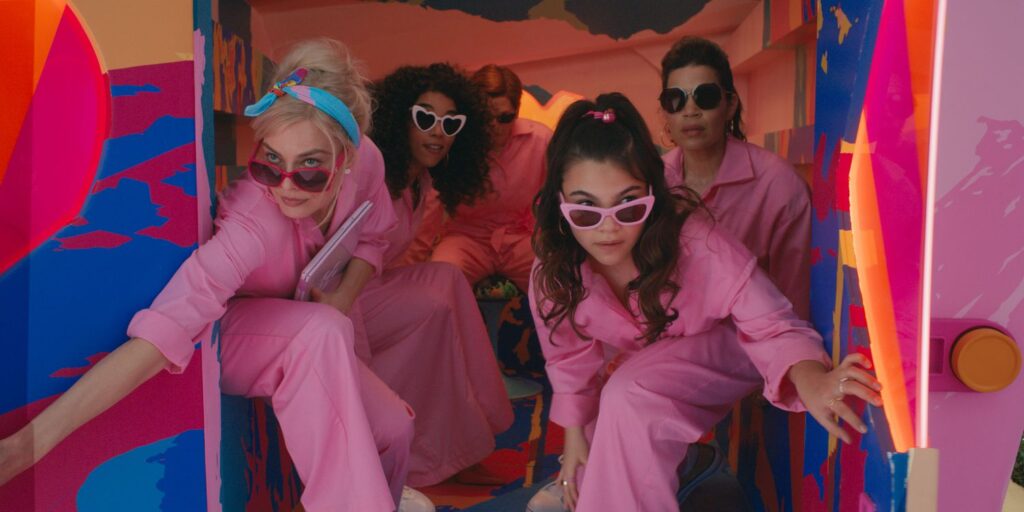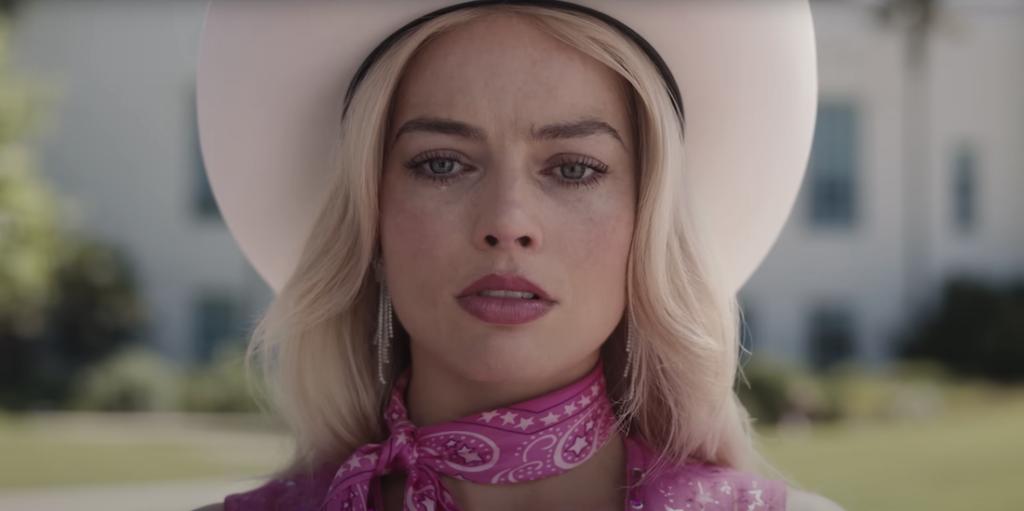Usually, monologues are frowned upon in movies. If they are included in a script, they often end up on the cutting room floor because screen time is just so precious. But the famous Barbie monologue, delivered by Gloria (America Ferrera) in Act 3, resonates so powerfully that audiences are both emotional and empowered!
While the monologue (from the screenplay written by Greta Gerwig and Noah Baumbach, with input from Ferrera) feels like the unexpressed voice of millions of women, it also pulls various elements of the story together in a coherent, strategic way: theme: check. Spine of the film: check. Empowering message: check. Rally cry for the protagonist: double check!!
Let’s take a look at the Barbie monologue and explore how a well-crafted monologue can drive the narrative forward and sharpen a story.
Read More: 10 Most Thought-Provoking Villain Monologues
Theme vs. Spine
Most of us know what theme is (that thing we had to write essays about in high school when we read books like Catcher in the Rye), it’s basically the underlying message or reason why the story is being told. Most movies have multiple themes and they are usually presented either as a statement to be disproved or a question to be answered.
In Barbie, some of the themes include self-acceptance, unrealistic expectations, idealized femininity, male vs. female roles in society, and consumerism to name a few. These themes are most clearly expressed when Barbie leaves Barbie Land, goes to the Real World, and heartbreakingly discovers that men rule society (unlike Barbie Land) and most girls shockingly abandon their Barbie dolls at a young age, making Barbie irrelevant to teen and adult women.

‘Barbie’ (2023)
The spine of a screenplay, however, is the central narrative that drives the plot and the characters’ actions. Think of the spine as the essential backbone that connects all the main events and actions of the characters as they explore and question the theme.
The spine of Barbie is Barbie’s journey to the real world to solve the mystery of why she’s malfunctioning. Dolls aren’t supposed to think about death, so something must be really wrong with Barbie! She thinks that if she can solve that mystery, her fallen arches (and her happiness) will return to their normal state. What she’s not expecting is how difficult and confounding the journey will be – especially to an outsider like her.
The Character Gloria
Gloria is a major ally for Barbie when she gets to the Real World. Gloria serves as a tour guide, helping Barbie navigate this foreign land. Gloria not only works for Mattel (Barbie’s creator) and has that inside knowledge, but she’s also a single mom whose own daughter has given up on Barbie dolls, amplifying the rift between mother and daughter. If Gloria can solve Barbie’s problem (i.e.: Barbie’s malfunction), she can solve her own problem with her daughter (i.e.: their relationship malfunction). This makes Gloria’s character the spine of the film personified.
Gloria’s Monologue
Gloria’s monologue not only hits at the heart of what modern women experience in society today, but it also serves as a battle cry for Barbie. Now in Act 3, Barbie feels defeated because she’s unable to discover the source of her malfunctioning – it’s her “All is lost” moment. She feels doomed to live the life of an unhappy plastic toy forever and never know the beauty and mystery of the human world. But Gloria’s monologue may offer Barbie a light at the end of the tunnel.
Let’s Look At The Opening of the Monologue
“It is literally impossible to be a woman. You are so beautiful and so smart, and it kills me that you don’t think you’re good enough. Like, we have to always be extraordinary, but somehow we’re always doing it wrong.”
Though this doesn’t provide a clear answer to Barbie’s issue of why she’s malfunctioning, it does help her to understand the unfair, prejudiced battle she is fighting. The expectations of real women are totally unrealistic, just like those of a Barbie doll. Finally, some common ground and a clear expression of one of the film’s main themes.

‘Barbie’ (2023)
Gloria Goes on to Say:
“You have to be thin, but not too thin. And you can never say you want to be thin. You have to say you want to be healthy, but also you have to be thin. You have to have money, but you can’t ask for money because that’s crass. You have to be a boss, but you can’t be mean. You have to lead, but you can’t squash other people’s ideas. You’re supposed to love being a mother but don’t talk about your kids all the damn time. You have to be a career woman but also always be looking out for other people. You have to answer for men’s bad behavior, which is insane, but if you point that out, you’re accused of complaining. You’re supposed to stay pretty for men, but not so pretty that you tempt them too much or that you threaten other women because you’re supposed to be a part of the sisterhood. But always stand out and always be grateful. But never forget that the system is rigged. So find a way to acknowledge that but also always be grateful. You have to never get old, never be rude, never show off, never be selfish, never fall down, never fail, never show fear, never get out of line.”
Gloria’s frustration and honesty about all the contradictions women face helps Barbie start to understand that women are expected to walk a tightrope between their real selves and who society thinks they should be. However, this is a tightrope where the walker is doomed to fall off! This is a clear expression of the spine of the film and Barbie’s journey.

‘Barbie’ (2023)
Gloria Continues:
“It’s too hard! It’s too contradictory and nobody gives you a medal or says thank you! And it turns out in fact that not only are you doing everything wrong, but also everything is your fault.”
Ding! That’s exactly what Barbie’s been feeling but didn’t know how to express it! She starts to feel inspired as Gloria sums it all up.
“I’m just so tired of watching myself and every single other woman tie herself into knots so that people will like us. And if all of that is also true for a doll just representing women, then I don’t even know.”

America Ferrera in ‘Barbie’ (2023)
This is the battle cry with the answer Barbie’s been searching for: stop worrying if other people like you because you cannot live up to other people’s expectations. You must accept your true self, flaws and all, despite all the twisted messages society sends you. This is easier said than done of course, but it’s the only way to get through human life.
This truthful, heartfelt monologue causes Barbie to snap out of her gloomy state of mind to see the reality of the situation and discover the solution. They must find the courage to fight unrealistic expectations, stand up to patriarchy and commercialism, and live their authentic, flat-footed lives.
Once the monologue is delivered, Barbie and Gloria can team up to help the other brainwashed Barbies escape the male-dominated world Ken has brought to Barbie Land and discover their own authentic selves.

‘Barbie’ (2023)
How To Use Monologues in Your Script
This monologue is a tool that allows the main characters (Barbie and Gloria) to find a resolution to their big problems and arc or change. As a screenwriter, determine which character represents the spine of your film and experiment with giving them a third-act monologue. Ask yourself: how does the monologue affect my protagonist? How does it change their trajectory? How does it clear the path to victory?
Monologues don’t have to be put in the third act, they can occur anywhere in the screenplay, but they usually come at an emotional turning point before a plot turning point. The monologue should clarify a character’s feelings to the audience and set in motion the character’s next moves.
Read More: How to Write Memorable and Compelling Monologues
Bottom Line
You may not have room in your screenplay for such a lengthy speech in your script, but just the act of writing the monologue may clarify and focus the story in your own head.
Read More: Barbenheimer: Why Are Barbie and Oppenheimer Battling at the Box Office?
CHECK OUT OUR PREPARATION NOTES SO YOU START YOUR STORY OFF ON THE RIGHT TRACK!
The post America Ferrera’s Glorious ‘Barbie’ Monologue Explained appeared first on ScreenCraft.
Go to Source
Author: Shanee Edwards

